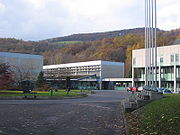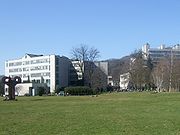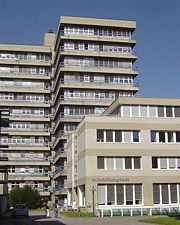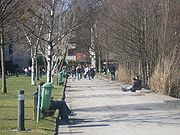
Johannes Kepler University of Linz
Encyclopedia





Linz
Linz is the third-largest city of Austria and capital of the state of Upper Austria . It is located in the north centre of Austria, approximately south of the Czech border, on both sides of the river Danube. The population of the city is , and that of the Greater Linz conurbation is about...
, the capital of Upper Austria
Upper Austria
Upper Austria is one of the nine states or Bundesländer of Austria. Its capital is Linz. Upper Austria borders on Germany and the Czech Republic, as well as on the other Austrian states of Lower Austria, Styria, and Salzburg...
. It offers bachelor's, master's, diploma and doctoral degrees in business, engineering, law, science, and the social sciences.
Today, 13,700 students study at the park campus in the northeast of Linz, with 1 out of 9 students being from abroad. The university was the first in Austria to introduce an electronic student ID in 1998 and the whole campus has Wireless LAN
Wireless LAN
A wireless local area network links two or more devices using some wireless distribution method , and usually providing a connection through an access point to the wider internet. This gives users the mobility to move around within a local coverage area and still be connected to the network...
coverage.
The university is home of the Johann Radon Institute for Computational and Applied Mathematics (RICAM) of the Austrian Academy of Sciences.
History
The JKU was established as the "College of Social Sciences, Economics and Business" (Hochschule für Sozial- und Wirtschaftswissenschaften) in 1966. The Faculty of Sciences and Engineering was established three years later and in 1975, the college was awarded university status and the Faculty of Law was integrated on campus. The university was named in honor of astronomer Johannes KeplerJohannes Kepler
Johannes Kepler was a German mathematician, astronomer and astrologer. A key figure in the 17th century scientific revolution, he is best known for his eponymous laws of planetary motion, codified by later astronomers, based on his works Astronomia nova, Harmonices Mundi, and Epitome of Copernican...
(1571-1630) who wrote his magnum opus harmonices mundi ("The Harmony of the world") in Linz during the early 17th century and taught mathematics at a school for the landed gentry (Adelichen Landt-Schuelen) near Linz. At present, the campus added the "Science Park", an additional building for science and engineering institutes.
Campus
JKU's campus is located in the northeast of Linz, in the Auhof area of the St. Magdalena district. The university buildings are placed in a 90 acre (364,000 m²) park centered around a pond.Infrastructure
The campus is accessible by the public tram lines 1 and 2 and the express bus line 77. On weekdays, trams travel every 7–8 minutes and a trip to the city center (Hauptplatz) takes approximately 16 minutes.The JKU is also located close to Austria's autobahn network at theDornach exit on the A7 Mühlkreisautobahn (ca. 1 km or 0.6 miles). In anticipation of extending the campus, an additional autobahn exit, Auhof, is currently in the construction stages and is expected to better facilitate traffic, allowing a more direct route to the university.
A bicycle path in the north-east corner of the town located along the north side of the Danube river provides direct access to the university and helps to reduce traffic in the area.
Housing
Many larger dormitories are within walking distance of the university, such as the Julius Raab Heim, the WIST Haus, the Kepler Heim, the ESH and the KHG Heim. Several other dormitories are located in different parts of Linz, providing housing for more than 3,100 students in all of Linz.Some of the dormitories become hotel
Hotel
A hotel is an establishment that provides paid lodging on a short-term basis. The provision of basic accommodation, in times past, consisting only of a room with a bed, a cupboard, a small table and a washstand has largely been replaced by rooms with modern facilities, including en-suite bathrooms...
s during the summer holidays, most notably the Julius Raab Heim under the name Hotel Sommerhaus.
Management
The university Rector and Academic Senate are responsible for the university's management. There are four vice rectors who are each assigned to specific task areas and who assist the Rector. The university board is an independent body that advises and counsels the Rector and Academic Senate on management issues. Deans and faculty committees are responsible for management on a faculty level. Rector and deans are elected for a 4 year period whereas faculty committees are elected for a 2 year period.In 2007 Richard Hagelauer was elected Rector. At present, Ferdinand Kerschner is head of the Academic Senate and Ludwig Scharinger is head of the University Council .
Faculties and Degree Programs
The Johannes Kepler University has three faculties with a total of 110 institutes (seven of these not associated with a specific faculty).Faculty of Social Sciences, Economics and Business (SoWi)
The Faculty of Social Sciences, Economics and Business is the oldest and largest faculty in terms of students and graduates. The faculty consists of 32 institutes and offers academic degrees in Economics and Business AdministrationEconomics
Economics is the social science that analyzes the production, distribution, and consumption of goods and services. The term economics comes from the Ancient Greek from + , hence "rules of the house"...
, Business Informatics
Business informatics
Business informatics or organizational informatics is a discipline combining information technology , informatics and management concepts. The BI discipline was created in Germany, from the concept of "Wirtschaftsinformatik"...
, Business and Education
Business education
Business education involves teaching students the fundamentals, theories, and processes of business. Education in this field occurs at several levels, including secondary education and higher education or university education. Approximately 38% of student enroll in one or more business courses...
, Social Economics
Socioeconomics
Socioeconomics or socio-economics or social economics is an umbrella term with different usages. 'Social economics' may refer broadly to the "use of economics in the study of society." More narrowly, contemporary practice considers behavioral interactions of individuals and groups through social...
, Sociology
Sociology
Sociology is the study of society. It is a social science—a term with which it is sometimes synonymous—which uses various methods of empirical investigation and critical analysis to develop a body of knowledge about human social activity...
and Statistics
Statistics
Statistics is the study of the collection, organization, analysis, and interpretation of data. It deals with all aspects of this, including the planning of data collection in terms of the design of surveys and experiments....
.
The faculty's abbreviation SoWi is derived from the German name of the faculty, Sozial- und Wirtschaftswissenschaftliche Fakultät.
Faculty of Engineering and Natural Sciences (TN)
The Faculty of Engineering and Natural Sciences was established in 1969 and initially offered degrees in Technical MathematicsMathematics
Mathematics is the study of quantity, space, structure, and change. Mathematicians seek out patterns and formulate new conjectures. Mathematicians resolve the truth or falsity of conjectures by mathematical proofs, which are arguments sufficient to convince other mathematicians of their validity...
, Computer Science
Computer science
Computer science or computing science is the study of the theoretical foundations of information and computation and of practical techniques for their implementation and application in computer systems...
and Technical Physics
Engineering physics
Engineering physics is the study of the combined disciplines of physics, engineering and mathematics in order to develop an understanding of the interrelationships of these three disciplines. Fundamental physics is combined with problem solving and engineering skills, which then has broad...
. Over time, degrees in Technical Chemistry
Chemistry
Chemistry is the science of matter, especially its chemical reactions, but also its composition, structure and properties. Chemistry is concerned with atoms and their interactions with other atoms, and particularly with the properties of chemical bonds....
, Mechatronics
Mechatronics
Mechatronics is the combination of mechanical engineering, electronic engineering, computer engineering, software engineering, control engineering, and systems design engineering in order to design, and manufacture useful products. Mechatronics is a multidisciplinary field of engineering, that is...
and Information Electronics
Computer engineering
Computer engineering, also called computer systems engineering, is a discipline that integrates several fields of electrical engineering and computer science required to develop computer systems. Computer engineers usually have training in electronic engineering, software design, and...
were introduced.
Several Master's degrees to specialize in the area of Computer Science, Mathematics and Physics, such as Pervasive Computing, Industrial Mathematics or Biophysics
Biophysics
Biophysics is an interdisciplinary science that uses the methods of physical science to study biological systems. Studies included under the branches of biophysics span all levels of biological organization, from the molecular scale to whole organisms and ecosystems...
are available. Doctorate degrees are offered in the areas of Natural Science
Natural science
The natural sciences are branches of science that seek to elucidate the rules that govern the natural world by using empirical and scientific methods...
and Technical Science
Engineering
Engineering is the discipline, art, skill and profession of acquiring and applying scientific, mathematical, economic, social, and practical knowledge, in order to design and build structures, machines, devices, systems, materials and processes that safely realize improvements to the lives of...
.
The TN faculty consists of 51 distinctive institutes and the German name is Technisch-Naturwissenschaftliche Fakultät, hence the abbreviation TN or TNF.
Faculty of Law (RE)
The Faculty of Law was officially established in 1975. Before that time period, law degrees were offered by the SoWi faculty, which was then theFaculty of Social Sciences, Economics, Business and Law. In addition to Diploma and doctorate degrees in law, the RE faculty offers a Bachelor's degree in Business LawCommercial law
Commercial law is the body of law that governs business and commercial transactions...
in cooperation with the SoWi faculty. Law degrees are also offered via multimedia distance learning.
The abbreviation RE is derived from the first two letters of the faculty's name German name, Rechtswissenschaftliche Fakultät. At present, the RE faculty consists of 20 institutes.
Distance learning
The JKU maintains several distance learning centers in Austria that offer degrees and courses at the German FernUniversität HagenFernUniversität Hagen
The University of Hagen, is the largest and the only state-run distance teaching university in Germany. The Headquarters are located in Hagen, Germany....
, the British Open University
Open University
The Open University is a distance learning and research university founded by Royal Charter in the United Kingdom...
and JKU's own distance law degree program.
Other universities in Linz
There are three other universities in Linz: The University of Arts Linz, a public university for arts and industrial design (ca. 800 students), the Anton Bruckner Private University for Music, Drama, and DanceAnton Bruckner Private University for Music, Drama, and Dance
Anton Bruckner Private University for Music, Drama, and Dance is one of four universities in Linz, the capital of Upper Austria. It has ca...
with approx. 1000 students enrolled, and the Catholic-Theological Private University Linz
Catholic-Theological Private University Linz
The Catholic-Theological Private University Linz is one of four universities in Linz, the capital of Upper Austria, with approximately 500 students enrolled. Its roots go back to 1672 and it is a Papal faculty since 1978...
with about 500 students, which has been a Papal faculty since 1978.
External links
- Official JKU website (German only)
- Information for prospective international students (in English)
- Information about JKU from a former student (in English)
Dormitories
- Julius Raab Heim
- WIST Haus
- Kepler Heim
- Evangelisches Studentenheim Linz (esh)
- Katholische Hochschulgemeinde Linz (KHG)
- Hotel Sommerhaus (Julius Raab Heim)

